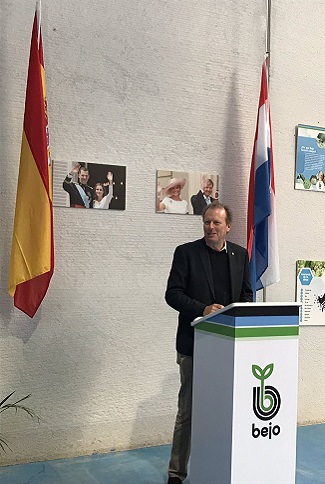Bejo Iberia has a research centre in Murcia, in addition to other RD&I activities throughout Spain.
Bejo is a family-owned Dutch multinational seed company based in Waarmenhuizen, in the north of the Netherlands. Within the seed industry, the company has mainly specialised in open field vegetables, such as carrots, onions and all kinds of brassicas (cabbages).
Its RD&I work uses genetics to improve seeds, in order to gain resistance to hostile environments and pests. With 30 years’ experience in Spain, the land is used to develop new varieties that Spanish farmers export, especially to northern Europe. Seeds created in Spain are also sown in countries all over the world, adding value to the Spanish agri-food industry.


Why develop new agri-food varieties? Is it because of consumer demand, or because you aim to anticipate market trends to strengthen your position?
Both. There are varieties that last 20 years or more on the market, but those are the exceptions. We usually develop varieties with improved characteristics, such as taste, resistance, yield and climate adaptability. We also aim to stay a step ahead of the market with innovative products.
You began distributing your products in Spain in the early 1990s, and soon decided to adapt your product to the Spanish climate and develop new varieties. How did you enter the Spanish market?
Thirty years ago we settled in a Spain that was very different from the country we see today in terms of agriculture. We’ve witnessed an impressive professionalization of the industry among farmers and throughout the entire food chain. Horticultural exports are one of Spain's most important assets. One example of our development is our response to the increase in transport prices. We've developed flatter varieties of cauliflower, which means that more product per pallet can be loaded onto the lorry. Something that I would like to emphasise is the fact that it is imperative to do everything possible to ensure that growers make money. This is the bedrock of collective security in the food industry. The extraordinary measures our customers, the growers, implemented to ensure the availability of fruit and vegetables in the shops during the two years of the pandemic are laudable, and they need to be able to continue to show a healthy profit at the end of the year so that they can go on investing in a better future.
How has Bejo Iberia evolved since the subsidiary was created a few years later?
Well, at the beginning we had almost no presence in the Iberian Peninsula. We’ve gradually positioned ourselves as a benchmark in the market. With committed, motivated people, a lot can be achieved.
What facilities do you have today in Spain, and how many people do you employ here?
Bejo Iberia has two offices, a small one in Portugal and our main office in Madrid. We also have a research centre in Murcia, and are involved in many other RD&I activities throughout Spain. The Bejo team consists of about 40 people in the office and on site.
What important investments has the company made in Spain?
Overall, Bejo reinvests about 20% in research. This translates into significant investment in staff, land, buildings, water, etc. Apart from a 20-hectare farm in Murcia and the office-warehouse in Madrid, Bejo has invested in the development of a microbulb facility in Jerez de la Frontera.
How important is Spain in the company's strategy?
Bejo is a company facing many challenges, and Spain is becoming increasingly important, simply because there is enormous potential here to be a benchmark in European food production. This translates into more investment in Spain.
Do you export domestically produced varieties?
Well, many of the varieties that we develop here are not only for production in Spain, they are then tested in similar climates in the rest of the world.
Who are Bejo's clients in Spain?
It’s difficult to describe a typical client. We sell to a great many customers, both small (one to five hectares) and large (over a thousand hectares). Each area of the Iberian Peninsula has its own particular characteristics. Galicia is not the same as Murcia, but we always try to introduce varieties that earn growers more money, both in terms of quality and production.
You also provide support to customers with value propositions that go as far as creating recipes with your varieties. What does this initiative bring to your market?
Well, each to their own. We don't aim to reach the consumer directly, but sometimes we have products (like redi.es) that are so new and such fun that we like to challenge the chain and step out of our comfort zone. It’s true that we look at the whole chain and its needs, providing added value to the products, such as taste, shelf life, nutritional value, colour, etc.
What projects do you currently have underway?
As I said earlier, Spain is a very interesting country for Bejo, and we’re ready to invest. Proposals are on the table.
Fotos: Bejo Ibérica



